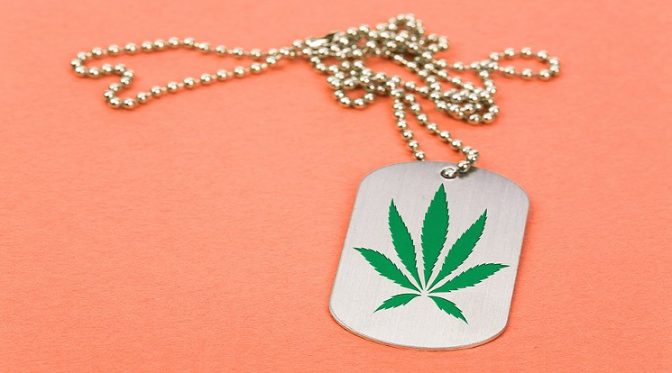Marijuana on Memorial Day: Veterans Help Reform Effort

Memorial Day 2016 is extra notable because the topic of military veterans and medical cannabis has gone mainstream.
As a nation, Americans are acknowledging that our dedicated soldiers are losing their lives more often on the home-front than on the battlefield. The public is now having an open conversation about Post Traumatic Stress Disorder (PTSD) and the endemic over-prescribing of opiate pills to vets. Marijuana has emerged as a common sense solution. Cannabis is not a panacea but it does represent a significant part of the new approach.
Mike Whiter has become of the most prominent voices on this issue. A U.S. Marine Corp vet who served in Iraq and now lives in Philadelphia, he’s been featured in numerous press reports, engaged dozens of politicians, staged protests and has found innovative ways to raise awareness to a deadly problem.
«Veterans are being overmedicated,» Whiter contends. «More than 22 veterans commit suicide every day, and pharmaceutical overdoses are a leading cause of death. Cannabis is a safe alternative to pharmaceutical treatment. In conjunction with therapy, marijuana can help a veteran regain control of his or her life.»
Whiter attributes the turnaround in his life to cannabis. After attending photography school he started #OperationOverMed and invited veterans to pose for a series of striking portraits that have been seen on international news outlets. The moving images have also been featured in Freedom Leaf.
For decades, vets have been quietly advocating for medical cannabis, but there was a definite shift in momentum when younger vets like Whiter returned from the recent conflicts in Iraq and Afghanistan. Some came home to states where affordable, top-quality cannabis is legally available under robust state access programs and then shared this knowledge with friends and fellow soldiers.
Still, not every state allows PTSD as a qualifying condition. And in states like New Jersey, New York, Pennsylvania, Louisiana and Ohio, the medical cannabis laws are so restrictive that they won’t reach many vets, even if PTSD is on the list.
On January 1, 2014, the international press crowded into Denver to document the first legal sale of marijuana under America’s first recreational marijuana regulation scheme. Iraq War vet Sean Azzariti made the first purchase. He didn’t qualify for medical cannabis in Colorado, but full legalization gave him access.
Despite state and local reforms, vets remain at the mercy of the Veterans Administration (VA) health system and the federal government, which dictate all of the rules. VA doctors were not allowed to discuss medical cannabis with vets, let alone recommend the therapy. However, a slight change in language to a massive federal appropriations bill passed this month may alter that dynamic.
Five years ago, Dr. Sue Sisley was teaching and doing research at the University of Arizona when she stumbled into the new realm of cannabis. By 2014 Sisley had won approval from the National Institute for Drug Abuse to perform a clinical trial investigating the efficacy of marijuana for PTSD, she was suddenly released from the school. Undeterred, she continued working with the Multidisciplinary Association for Psychedelic Studies (MAPS), the University of Pennsylvania and the Department of Veterans Affairs National Center for PTSD. The project gained funding, in part, by a grant from Colorado’s recreational marijuana tax revenue.
By next year, Dr. Sisley will begin administering four strains of cannabis with a variety of THC and CBD levels to 76 veterans in Arizona and Maryland. She hope to find the cannabinoid levels that work best.
«Individuals with PTSD suffer decreased quality of life,» she says. «Anxiety increases along with depression. PTSD sufferers face an increased risk of poor health. Relationships suffer, divorce rates increase, success in school fades and many become unemployed. At this moment over 100,000 veterans—many with PTSD—are homeless.»
According to Dr. Sisley, there’s no pharmaceutical drug on the market that effectively treats PTSD:
«The current use of SSRI-type anti-depressants and anti-anxiety medications, the mainstay of treatment, are of limited value for many patients. Often, these medications don’t work well or the side effects, such as obesity, grogginess and decreased sexual function, cause many patients to discontinue therapy. Psychotherapy may be helpful for some but is of limited availability. An additional pharmacological agent to treat PTSD could be very beneficial for many patients.»
Vets report that cannabis helps make them more social, alleviates reliving traumatic experiences and aids with sleep. The high or «feeling good» is a positive side effect. «We have a very good retrospective study from the State of New Mexico Medical Advisory Board,» Sisley adds. «New Mexico was the first state to approve PTSD as a qualifying condition for treatment under their medical cannabis program.»
That study determined that «greater than 75% reduction in CAPS [Clinician Administered PTSD Scale] symptom scores were reported when patients were using cannabis than when they were not… There is extensive evidence that cannabinoids may facilitate extinction of aversive memories.»
Dr. Sisley and her research partners have spent years gaining every single federal approval. When the data is complete it will be the first time that the government has any official knowledge on the subject.
Since the Eastern portion of the study is being conducted at Johns Hopkins University in Maryland, there’s a chance that advocate Whiter could end up as one of the participants. He’s currently undergoing screening to take part. «I know that it works,» he tells Freedom Leaf. «I want to help prove it.»
In the meantime the same issues that brought vets to cannabis have become national problems. Opiate painkillers like oxycontin have been ravaging the country. Overdose deaths are skyrocketing in all communities.
Then a little known data gathering project discovered something that continues to make headlines: Dr. Michael Bachhuber MD, the Robert Wood Johnson Clinical Scholar at the Philadelphia Veterans Affairs Medical Center, found that painkiller overdose deaths are 25 percent lower in states with medical marijuana.
More importantly, the National Bureau for Economic Research published data replicating those results. The most crucial takeaway from the both reports is that the dramatic effect is only seen in states that have easy access. Limited programs or CBD oil only laws see few patients registered and there is no opportunity to reduce opiate overdoses.
Today, as we remember our fallen soldiers, we also have a tremendous opportunity. When our women and men commit to military service their deadliest battle should not be with their own support system. Cannabis reform forces us to update and streamline surrounding bureaucracies in healthcare and criminal justice. That is good for everyone and why legalization is a fundamental civil rights issue.
Whiter says with all sincerity and honesty, «Marijuana saved my life.» His mission has been to share that message with the same dedication that he used to lead a platoon. Everyone is finally listening.
Marijuana can keep more of our vets in parades and out of graves every Memorial Day.
If you enjoyed this Freedom Leaf article, subscribe to the magazine here

